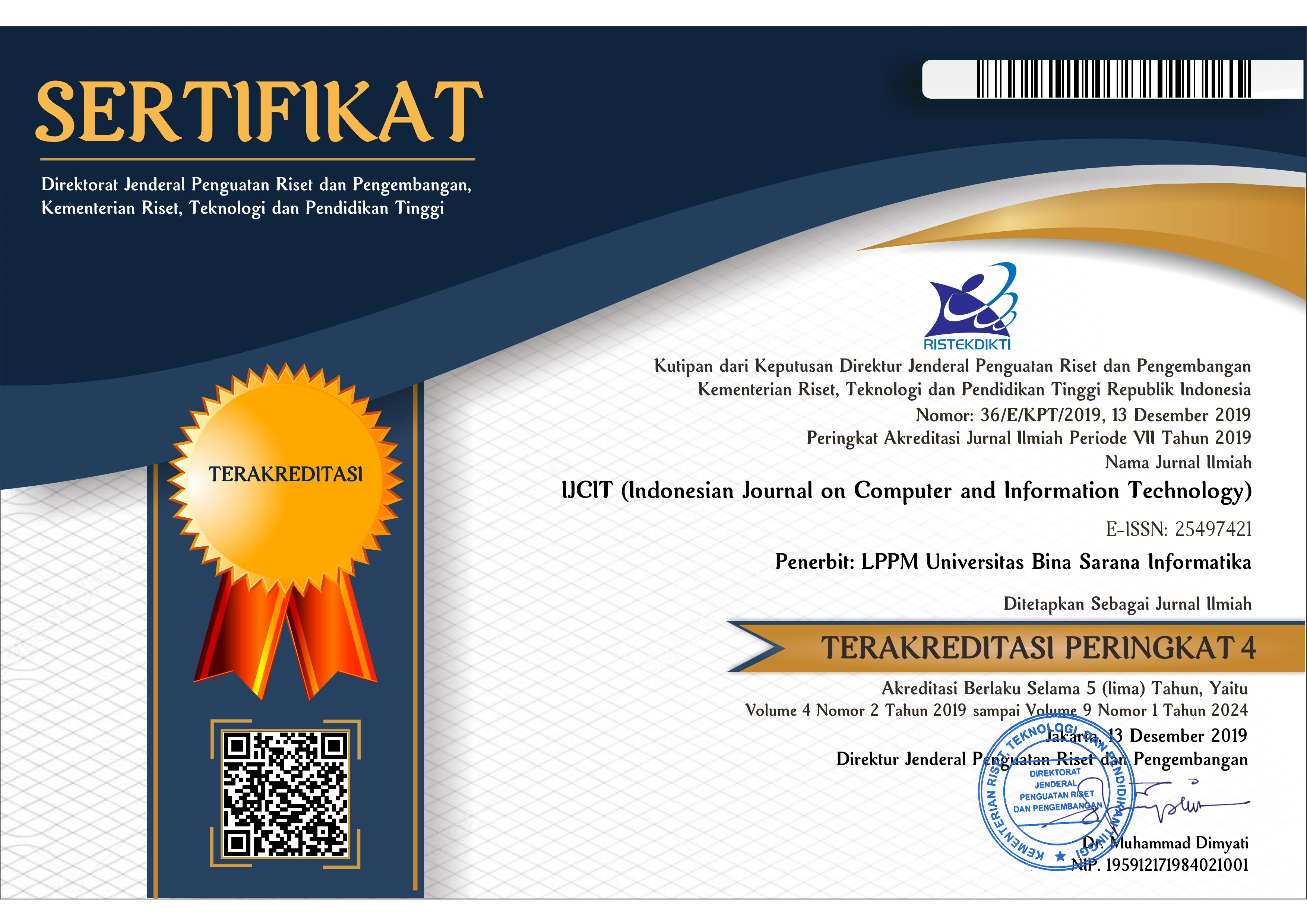Implementasi Metode Lexicon Based dan Support Vector Machine Pada Analisis Sentimen Ulasan Pengguna ChatGPT
Sari
ChatGPT review sentiment analysis is the process of assessing and categorizing the feelings or opinions of ChatGPT application users which are reflected in the reviews they write on the platform. In this research, sentiment analysis of ChatGPT application reviews will be carried out based on data on the Google Play Store using the Support Vector Machine (SVM) algorithm. The dataset used was obtained through a scraping technique using the Python library, namely google-play-scraper, which produced 1393 ChatGPT application review data. Because the collected dataset does not yet have a sentiment label, the labeling process was carried out using a lexicon-based method, by applying the Inset dictionary to the Lexicon to calculate the value of polarity occurrences in each review. The SVM algorithm is applied for sentiment classification and has been proven effective in various previous studies. The lexicon-based method provides highly relevant features while SVM is able to optimize classification by learning patterns from the data and this combination is more robust to variations in user reviews, such as slang or subjective expressions, which may be less detectable if relying only on one method. Therefore, this research shows that the combination of lexicon-based methods and SVM is able to achieve the highest accuracy of 90% and precision of 94%. These findings demonstrate the potential of this method in automatically classifying app review sentiment, providing valuable insights for app developers and other stakeholders.
Teks Lengkap:
pdf: 80-86Referensi
Ananda, D., & Suryono, R. R. (2024a). Jurnal Media Informatika Budidarma Analisis Sentimen Publik Terhadap Pengungsi Rohingya di Indonesia dengan Metode Support Vector Machine dan Naïve Bayes. Jurnal Media Informatika Budidarma, 8(2), 748–757. https://doi.org/10.30865/mib.v8i2.7517
Ananda, D., & Suryono, R. R. (2024b). Jurnal Media Informatika Budidarma Analisis Sentimen Publik Terhadap Pengungsi Rohingya di Indonesia dengan Metode Support Vector Machine dan Naïve Bayes. https://doi.org/10.30865/mib.v8i2.7517
Aryanti, R., Fitriani, E., Royadi, R., Ardiansyah, D., & Saepudin, A. (2024). Sentiment Analysis of E-Grocery Application Reviews Using Lexicon-Based and Support Vector Machine. Jurnal Riset Informatika, 6(3), 149–158.
Defriani, M., Muttaqin, M. R., & Karima, Q. R. (2024). Sentiment Analysis of the LinkedIn Application Using the Lexicon Based Meth¬od Based on Google Play Store Reviews. RISTEC : Research in Information Systems and Technology, 5(1), 1–14. https://journal.institutpendidikan.ac.id/index.php/ristec/article/view/1156
Faisal, H., Febriandirza, A., & Hasan, F. N. (2024). Analisis Sentimen Terkait Ulasan Pada Aplikasi PLN Mobile Menggunakan Metode Support Vector Machine (Vol. 5, Issue 1).
Kacung, S., Pamungkas, C., Bagyana, P., & Cahyono, D. (2024). Analisis Sentimen Terhadap Layanan Samsat Digital Nasional (Signal) Menggunakan Metode SVM (Vol. 7, Issue 1).
Muthia Sakhdiah, Admi Salma, Dony Permana, & Dina Fitria. (2024). Sentiment Analysis Using Support Vector Machine (SVM) of ChatGPT Application Users in Play Store. UNP Journal of Statistics and Data Science, 2(2), 151–158. https://doi.org/10.24036/ujsds/vol2-iss2/158
Ningsih, W., Alfianda, B., Rahmaddeni, R., & Wulandari, D. (2024). Perbandingan Algoritma SVM dan Naïve Bayes dalam Analisis Sentimen Twitter pada Penggunaan Mobil Listrik di Indonesia. MALCOM: Indonesian Journal of Machine Learning and Computer Science, 4(2), 556–562. https://doi.org/10.57152/malcom.v4i2.1253
Pahtoni, T. Y., & Jati, H. (2024). Analisis Sentimen Data Twitter terkait ChatGPT menggunakan Orange Data Mining. Jurnal Teknologi Informasi Dan Ilmu Komputer, 11(2), 329–336. https://doi.org/10.25126/JTIIK.20241127276
Saepudin, A., Aryanti, R., Fitriani, E., Ardiansyah, D., Bina Sarana Informatika Jl Kramat Raya No, U., Senen, K., Jakarta Pusat, K., Khusus Ibukota Jakarta, D., & Author, C. (2024). Analisis Sentimen Pemanfaatan Artificial Intelligence di Dunia Pendidikan Menggunakan SVM Berbasis Particle Swarm Optimization. In Computer Science (CO-SCIENCE (Vol. 4, Issue 1).
Suharmawan, W. (2023). Pemanfaatan Chat GPT Dalam Dunia Pendidikan. Education Journal : Journal Educational Research and Development, 7(2), 158–166. https://doi.org/10.31537/ej.v7i2.1248
Wulandari, C., & Sunardi, L. (2024). KLIK: Kajian Ilmiah Informatika dan Komputer Analisis Sentimen Aplikasi Spotify Pada Ulasan Pengguna di Google Play Store Menggunakan Metode Support Vector Machine. Media Online, 4(5), 2588–2595. https://doi.org/10.30865/klik.v4i5.1762
Zein, A. (2023). 9 Creative Commons Attribution 4.0 International License Dampak Penggunaan Chatgpt Pada Dunia Pendidikan. JITU: Jurnal Informatika Utama, 1(2). https://doi.org/10.55903/jitu.v1i2.151
DOI: https://doi.org/10.31294/ijcit.v9i2.23948
##submission.copyrightStatement##
##submission.license.cc.by-sa4.footer##
P-ISSN: 2527-449X E-ISSN: 2549-7421
Statistik Pengunjung Jurnal IJCIT











